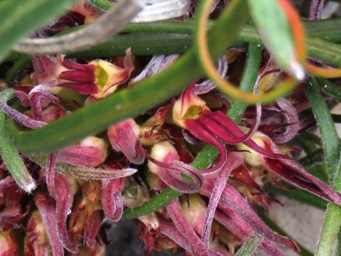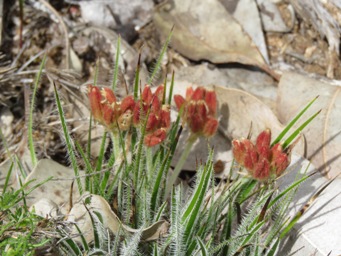Australia So Much to See
Copyright (C) 2013 AustraliaSoMuchtoSee.com. All rights reserved


Sources used for identification of wildflowers shown on these pages and regions where they occur see Credits
These pages will
feature some of the wildflowers we have photographed in Western Australia, and where possible, identified. If you
are able to help identify further flowers, or correct any I may have wrong, please contact us.
Information given for each species
will give botanical name, known common names, describe the flower, give time of year it flowered, and where it was photographed, and
the areas it occurs in. Names have been matched to Florabase which has also been used to show distribution.
See some
of these wildflower in larger sized photos on our Flickr pages.
Conostylis setigera, (Red form photographed) Bristly Cottonheads
Flowers have a furry exterior and are in a tight cluster on
the end of a stem, usually yellow, Conostylis setigera can be found in yellow or red. The flower heads shown above are closed,
and may have yellow flowers when open. Thin strap shaped leaves have hairy bristles along the edges. This is a very small
plant.
Spring
Bridgetown (above), South West, Western Australia and through the Wheatbelt, South West and Great Southern
Regions and along the south coast to east of Esperance.
The similar flowers below (with below right expanded to show foliage)
are similar to above, but have not or no obvious bristles so unlikely to be Conostylis setigera, but what species they are is
unknown.
These were seen in October between Busselton and Nannup, in the South West region, Western Australia.
These were seen in October between Busselton and Nannup, in the South West region, Western Australia.

Conostylis pusilla A very small type of yellow Conostylis on a plant with hairy spines along the edges (above right)
Bridgetown
Occurs in the Mid West, Wheatbelt, South West and Great Southern Regions.
Bridgetown
Occurs in the Mid West, Wheatbelt, South West and Great Southern Regions.


Conostylis aculeata, Prickly Conostylis, Yellow Cottonheads (above). Photo above shows the flowers finishing and closing.
Flowers have
a furry exterior and are in a tight cluster of six petalled flowers on the end of a stem. Long flat leaves with spines along
the edges (at right).
Marchagee above left and Bridgetown at right and above right.
Occurs in the Mid West, Wheatbelt, South
West and Great Southern Regions from Shark Bay to Albany.
Conostylis, Yellow Cottonheads
The Conostylis genus is a member of the same family as the Kangaroo Paw. A plant of which there
are many species, with long flat leaves often with spines or hairs along the edge. Flowers have a furry exterior and are
in a tight cluster of six petalled flowers on the end of a stem. Some Conostylis species have very short flower stems.
Most are yellow with some being white or red.
Spring to early summer

Conospermum stoechadis Common Smokebush
A low bush with small grey flowers along branching stems
Spring
Photo at left at Lancelin in
September and photos below at Dragon Rocks Nature Reserve, Newdegate in November. Grows through the Mid West, Wheatbelt,
Great Southern and Goldfields regions



Conostylis at right was seen along the Nangetty-Walkaway Road, has a tight bunch of flowers at the top of a long stem.
This may be Conostylis aurea, Golden Conostylis. Most of the flowers on this specimen have finished.



Conospermum capitatum
An unusual red/brown cluster of flowers almost hidden in the dense curly strip-like foliage of the bush, which
can reach up to 1.5 metres high. Flowers can be seen top right. These are in the same genus as the Smokebush flowers,
but are so different.
November



Conostylis candicans subsp. calcicola, Grey Cottonheads
Narrow strap-like foliage with no bristles, spines or hairs. A silver-grey
appearance of the foliage. Flower head tightly bunched at the top of a long stem.
September
Lancelin, coastal Wheatbelt
region, and found in coastal areas from Geraldton to Myalup, through parts of coastal Wheatbelt, Perth and South West regions, favouring
calcareous sand and coastal dunes.




